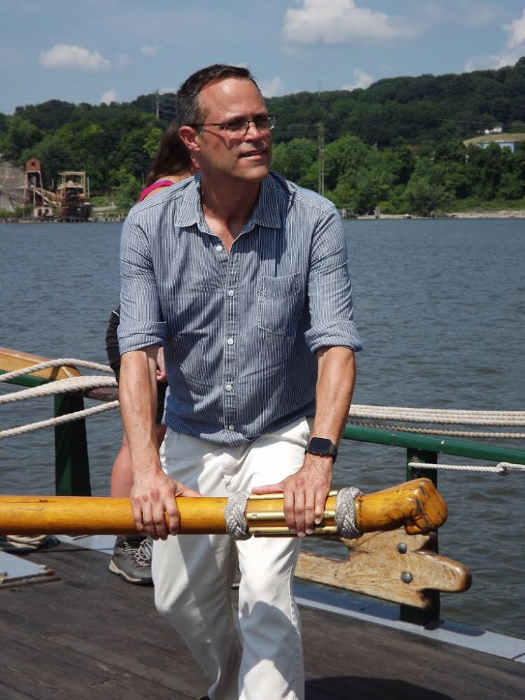
Greg Williams, who lives in Cold Spring, is the executive director of Hudson River Sloop Clearwater.
You’ve been director for a year. What accomplishments stand out?
Stabilizing our financial position and removing a lot of the conflict and inefficiency from the way we operated. We recently managed to vote on two critical measures at a full board meeting and have those two measures pass unanimously within 10 minutes. That’s a huge improvement over meetings when we’d discuss issues for hours and not get to a vote.
This year marked the 50th anniversary of the launching of the sloop. What do you think the next 50 years will hold?
We’re going to continue doing the things we do well. The experience of sailing with us — whether you’re a volunteer, a crew member or a guest — is one that you can’t find anywhere else. We have this 3,000-pound sailing rig, and we tell you that you’re going to lift it. Immediately you see how, if you work together with people, even if they’re people you’ve never met before, you can get that rig up and do something that you, just minutes before, thought was impossible. And then, for the next hour or two, you get to be among an incredibly diverse crew, young and old, who come from all kinds of backgrounds yet manage to live peacefully, happily and productively on this tiny boat with no air conditioning.
You grew up in Croton but moved from Seattle to take the job. What drew you back?
I grew up hearing songs by Pete Seeger [who founded Clearwater] and with the [Great Hudson River Revival] festival held every year at Croton Point Park, but I had other ideas of what kinds of public interest work I wanted to do. I did them, and also worked in the private sector. But then I saw Pete on the David Letterman show. He said he loved being an activist, but if younger people didn’t take on his causes, they would not progress beyond the end of his life. A few years later, when the position opened at Clearwater, I couldn’t believe my good fortune at being able to apply.
To an outsider, it seems that environmental organizations in the Hudson Valley work well together. Do you agree?
I do. There’s not a lot of overlap in our areas of expertise. Scenic Hudson acquires and manages beautiful and environmentally significant properties, which is something others don’t have the financial resources to do. Riverkeeper monitors pollution and other conditions on the river, and at Clearwater, we don’t have the logistical capacity for that. What we have is this unusual social ecosystem between the paid crew and volunteers on the boat, our environmental action organization, and our relationships with the artistic community. We can get someone onto a citizens’ action committee for the Indian Point decommission, for instance, because we’re known as a cooperative reason- and research-based organization. We get those invitations whereas other organizations might not.
Are you hopeful about the future?
Every day I have a new experience with a new crew member or a new volunteer who is motivated to devote his or her life to better society. We’re surrounded by so much hate and discord and blaming that it’s hard not to worry about our ability to solve problems. But when you see volunteers and staff and students working together to accomplish difficult things, it restores your hope that forces can be marshaled to solve problems like climate change.

